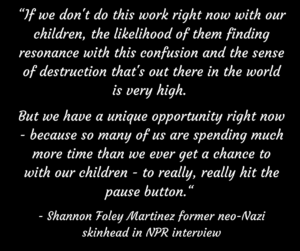The other day I listened to a radio segment that put chills through my body.
Racism, skinheads, and violent extremists are making a major comeback and they are doing it now, during Coronavirus. They are using online tactics to engage teens so the teens learn to love hate.
More teens than ever are spending time online and the time is significant. They are already online for school and with the lock-down, it is most easy and convenient to nurture relationships online.
As you may remember from being a teen, there is an increased drive for independence, they are looking to both rebel against authority figures and for peer acceptance. They will do what it takes to fit in while firming-up their sense of identity.
With the time online and desire to fit in, our teens are easy prey for these large strategic online groups. The groups come in to fill the teen’s needs of purpose, belonging, and a direction to focus passion and energy. When recruited, the teens feel appreciated and can see a successful future for themselves.
This idea is terrifying for me, yet I know that with compassionate parenting, we don’t need to worry.

In compassionate parenting, we establish connection by becoming our teens’ guide instead of an authority figure they feel the need to rebel against. We create an environment where the family is an endless supply of support, guidance, and understanding. When teens feel like they fit into their family and are understood by their family, they simply don’t have the need to rebel and find acceptance elsewhere.
To do this takes intention. It requires that we give up our need for parental control and become a compassionate leader/ partner with our child.
We guide using our values, boundaries and limits rather than employing the dominant parenting method of discipline, punishment, and control. Dominant parenting gives kids something to rebel against. We take intentional time to create a space for “play” even though play looks very different with teens than with younger kids. We listen without judgment or giving advice. We become a sounding board that supports them in a way that feels nurturing and loving. We let go of the way we were parented – the way that we are unconsciously passing down to our children, the way that didn’t serve us and created feelings of angst as a teen.
This doesn’t mean we are permissive or go to lengths to please our teen. We do this while maintaining our values and learning communication skills to express ourselves authentically with our kids.
When this relationship is established, it is based on mutual respect and empathy. It is then that our kids respect our modeling and values and make choices based on that influence.
The idea of a mutual relationship may sound unbelievable and scary if it is not something that has been experienced. I assure you, millions of parents have created just this and the result is that the world is a more peaceful and safer place.
—
Resources
How to report:
Disengaging from hate groups:
Additional information about internet safety:
Information about hate
References
Original article
Other References

